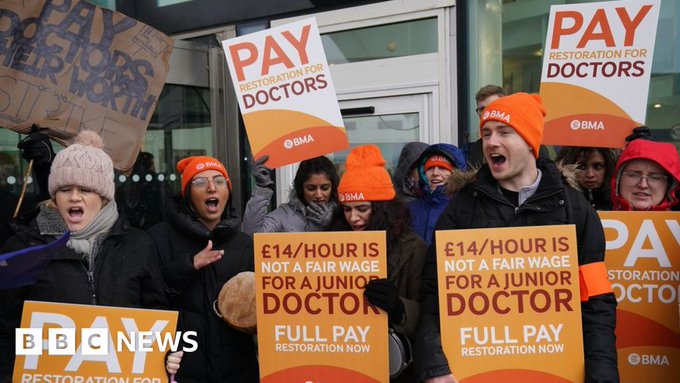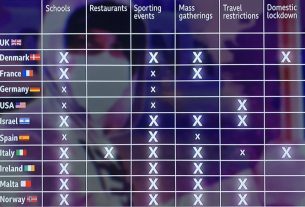With junior doctors demanding a 35%-pay rise and the government insisting it cannot afford such a sharp increase, the BMA has asked the government to enlist conciliation service Acas to help end the stand-off. The British Medical Organisation, representing junior doctors, told the BBC that working with Acas provided “the most realistic chance” of ending the junior doctor strike action. The government is said to be open to involving the impartial Advisory, Conciliation and Arbitration Service in bringing the two sides to an agreement.
Around 47,000 junior doctors are striking for four days and demanding a 35%-pay increase claiming the wages had slumped by 26% in real terms over the last 15 years because of inflation. But the government insists it cannot afford to meet such “unreasonable” demands. The BMA calculated that only a 35%-increase would represent full-pay restoration.
In March, brief talks took place but ended in failure. Now, the BMA says it will only negotiate in the presence of a “credible offer”. For his part, Health Secretary Steve Barcley wants junior doctors to drop the 35%-demand before the government re-enters negotiations.
A Department of Health and Social Care (DHSC) spokesman told Sky News on Thursday morning:
“The health and social care secretary has been clear his door is open, and he remains willing to engage constructively – but that a demand of 35%, which would involve some junior doctors receiving a £20,000 pay rise, is unreasonable in the current economic context.
“We’ve been engaging with ACAS during this dispute and remain open to considering whether there is a role for them to help us reach the desired outcome – an end to strike action which is putting patient safety at risk.
“But our position remains that the junior doctors’ council needs to significantly reduce its demand for a 35% pay increase and pause action for formal talks to begin, and that will not change.”
In response, Philip Banfield, BMA council chair, said:
“In the face of a constant refusal from the health secretary to agree to further talks and put forward a credible offer which could bring an end to the dispute, we believe that working with ACAS provides the most realistic chance of a successful outcome to the negotiations.
“The BMA has no preconditions to talks and has consistently sought to negotiate with the government.
“It takes both sides of a dispute to want to find a solution, and we urge the Health Secretary to show the same willingness that we have and make himself available and open to talks facilitated by ACAS.”
Speaking to the BBC, NHS Confederation chief executive Matthew Taylor warned that the current approach could put patient welfare at risk, expressing hope that ACAS’s involvement could lead to resolving the dispute.
NHS England pay deal vote result due this Friday
Beyond the junior doctors strike, this winter has seen walkouts by various NHS staff sections, including ambulance workers, nurses, and physiotherapists. This week NHS England union members are voting on the deal agreed with the government earlier this year; a 5% wage increase alongside a lump sum. The Unison and Royal Collage of Nursing staff ballots end on Friday, with results expected a short time later.
The government’s delay in reentering negotiations may indicate that it might “be using the strategy of waiting for the nurses to accept the 5%” to then urge junior doctors to do likewise.
The junior doctor strike has seen the cancellation of hundreds of thousands of operations and appointments, with working staff prioritising emergency and urgent medical care.




